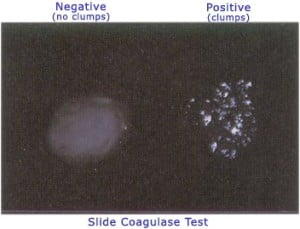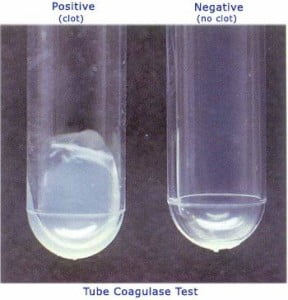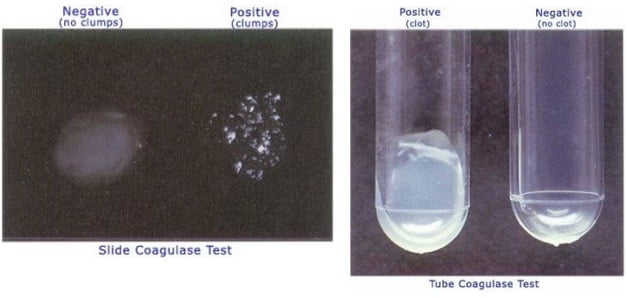Introduction to Coagulase Test
Coagulase test is used to differentiate Staphylococcus aureus (positive) which produce the enzyme coagulase, from S. epidermis and S. saprophyticus (negative) which do not produce coagulase. i.e Coagulase Negative Staphylococcus (CONS).
Principle of Coagulase Test
Coagulase is an enzyme-like protein and causes plasma to clot by converting fibrinogen to fibrin. Staphylococcus aureus produces two forms of coagulase: bound and free.
Bound coagulase (clumping factor) is bound to the bacterial cell wall and reacts directly with fibrinogen. This results in an alternation of fibrinogen so that it precipitates on the staphylococcal cell, causing the cells to clump when a bacterial suspension is mixed with plasma. This doesn’t require coagulase-reacting factor.
Free coagulase involves the activation of plasma coagulase-reacting factor (CRP), which is a modified or derived thrombin molecule, to from a coagulase-CRP complex. This complex in turn reacts with fibrinogen to produce the fibrin clot.
Procedure and Types of Coagulase Test
Slide Test (to detect bound coagulase)
- Place a drop of physiological saline on each end of a slide, or on two separate slides.
- With the loop, straight wire or wodden stick, emulsify a portion of the isolated colony in each drops to make two thick suspensions.
- Add a drop of human or rabbit plasma to one of the suspensions, and mix gently.
- Look for clumping of the organisms within 10 seconds.
- No plasma is added to the second suspension to differentiate any granular appearance of the organism from true coagulase clumping.
Tube Test (to detect free coagulase)
- Dilute the plasma 1 in 10 in physiological saline ( mix 0.2 ml of plasma with 1.8 ml of saline).
- Take 3 small test tubes and label as T (Test), P (Positive Control) and N (Negative Control). Test is 18-24 hour broth culture, Positive control is 18-24 hr S. aureus broth culture and Negative control is sterile broth.
- Pipette 0.5 ml of the diluted plasma into each tube.
- Add 5 drops (0.1 ml) of the Test organisms to the tube labelled “T”, 5 drops of S. aureus culture to the tube labelled “P” and 5 drops of sterile broth to the tube labelled “N”.
- After mixing, incubate the three tubes at 35-37 Degree Celsius.
- Examine for clotting after 1 hours. If no clotting has occurred, examine at 30 minutes intervals for up to 6 hours.
Interpretation of Coagulase Test


(Picture Source: University of Malta, Msida MSD 2080, Malta)
Fibrin Clot of any size- Positive
No Clot- Negative
- Clumping in both drops of slides indicates that the organism auto agglutinates and is unsuitable for the slide coagulase test. All the negative slide test must be confirmed using the tube test.
- During slide test, there may be chance to false positive results in case of citrate utilizing bacteria ( Enterococcus and Pseudomonas). In this case also, tube test should be performed and confirmed.
Examples
Coagulase Positive Organisms: Staphylococcus aureus and other animal host bacteria like S. pseudintermedius, S. intermedius, S. schleiferi, S. delphini, S. hyicus, S. lutrae, S. hyicus
Coagulase Negative Organisms: Staphylococcus epidermidis, S. saprophyticus, S. warneri, S. hominis, S. caprae, etc.


Which kind of plasma should we use for tube test since undiluted plasma should be use for slide test?
Is this test only for staphylococcal bacteria? Or can you also use gram-negative rods for this test?
I have to perform tests for a school assignment to identify an unknown bacterium. We know that the bacterium is a gram-negative rod.
Thank you in advance!
You can check their biochemical activity through IMViC test.
Does mixing plasma from different people cause errors in the test??
Why we should use undiluted human plasma for slide coagulase test ?
If we diluted the plasma,the amount of fibrinogen become reduce gradually and for that we cannot perform the coagulase test perfectly, and so we should use undiluted plasma for slide coagulase test
Because human plasma may contain inhibitor,which neutralize the coagulase enzyme and clumping is not and false positive result maybe detected.
could you please differentiate the above bacteria in bound coagulase producing ,free coagulase producing and also the species producing both like s.aures ……..
Why I must use rabbit plasma.. Not human plasma in this test??
yes, you can human plasma too but that plasma should be only EDTA mixed. Avoid using citrate/oxalate/heparinized plasma bcz citrate utilizing bacteria may cause false positive results
You can use rabbit OR human plasma
Tube coagulase test can demostrate free coagulase or both bond and free coagulase?
Yeah
Slide test is to detect bound and test tube is to detect free coagulase..
Dear Sagar
In most texts they recommend to dilute the plasma up to 5 times,so why in your procedure,it is recommended to 10 times dilution?
Regards
It is because of the immunity differences, human plasma may contain inhibitory factors such as antibiotics.